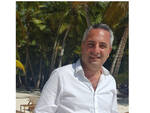Family-Run Businesses Dominate Piano
Più informazioni su
Down the street from our office in Piano di Sorrento, business owners at every corner are passionate. A local creator of a very important product is honey. A fishmonger supplies more goods down the street, and a musician sells various kinds of instruments. Everyone we meet is open to talking about their business’s role in the community to foreign journalists. And the foundation is human interaction.
Miele d’Angelo, Via Bagnulo, 43, 80063, is a small family farm founded in 1988 whose passion for nature and bees has carried on throughout the d’Esposito family.


In recent years, Miele d’Angelo expanded its branch of honey production in the Sorrento Peninsula, increasing production by adding more hives. Since the company was founded, honey production methods haven’t changed. Some products include orange honey, chestnut honey, lemon honey, honeydew honey, millefiori honey, fig jam, strawberry jam honey and nocciomiè spread.
As a result of less transportation and general lockdowns, there was an immediate effect on the air quality. We spoke to Angello d’Esposito, a worker at the farm, about how the reduction of fumes was better for beekeeping during the COVID-19 pandemic. The family-run farm has 300 hives, and each hive holds 50,000 honeybees. They begin harvest in March and finish around the August / September months. According to a 2022 study, NO 2emissions decreased in Italy. During the pandemic, honey consumption increased as it acted as a potential enhancer of immunity defense which increased the demand. In most ecosystems, bees are the primary insect pollinators, and they have a massive effect on the world around us. Environmental conditions improved with a positive impact on honeybees’ quality due to less pollution and human disruption.
The Pescheria, Il Delfino, located at Piazza Cota, 58 80063, is a fish market that means dolphin. Lena di Martino managed the family business with her husband di lei for decades, which once belonged to her grandfather di lei. They continue to follow the maritime traditions, even after 100 years. The market opens at 7 am, though Lena and the other workers open the shop around 3 am The fishermen then return back to the sea around 6 am


Lena said business is always busy and local restaurants buy their quality products. If you’re a seafood lover, Il Delfino should be your next stop. On a stroll through Piano, you begin to understand the importance and value of family-run businesses.
Very different than a honey store and a fish market, but somehow similar, is a musical instrument store also in Piano. Owner of Amadeus Musical Instruments and Events, located at Corso Italia 385 80063, and musician Raffaele Mormile plays the piano and organ. His talent for music began at 8-years-old, along with three other siblings who also have the musical talent gene. They often play together, and Mormile writes his own music by him. His brother and co-worker repair instruments and have a school of music where they teach piano, violin, guitar and percussion. He performs at weddings, hotels, churches, restaurants and bars (the events find him).


So, what do all these businesses have in common? In the Italian shareholding market, family businesses represent up to 60%. Almost every store I’ve walked into in Italy is run by a family, and there is a clear difference bet ween the corporate companies. The owners and staff all focus on something other than sales. Interaction is the main principle, and it will remain as future generations succeed.







